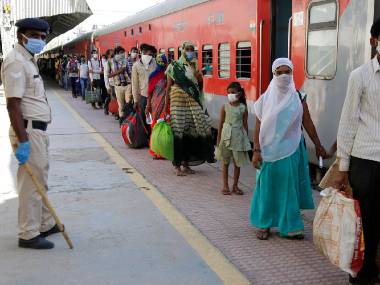SC order on migrant workers a welcome move, but with most labourers already ferried home, it has come a bit too late
by Sanjay SinghSupreme Court directive to the Centre and the states on how the migrant workers' reverse migration should be handled is a welcome move. It provides great deal of comfort to those who are still waiting to return home and eliminates the possibility of any more bickering between central and state agencies.
But the apex court directive has come a bit too late in the day. And, it may not have much of relevance on the ground. Not because the Centre and states would flout the verdict, but because these measures had already been put in places. The peak of the migrant workers' desperate rush to home has passed and now very less people are left to be transported to their native states.

Also, industrial and economic activities are slowly resuming, which requires employment of labour and given the demand-supply imbalance, there is a real possibility of wages going up. The changed scenario is now making sections of migrant workers to stay where they are.
Now, let us go through the court's directions and the situation that prevails today.
It has been directed that no fare would be charged from the migrant workers on their journey to home. It’s true that initially there was some confusion as to who would pay for migrant workers’ ticket for home. The booking counters were not open, and no online booking was taking place. The system was that the Railways would give the tickets in bulk to the sender state and the local administration would screen the already registered passengers, hand over individual tickets and take them to the station.
Some sender states wanted reimbursements from receiver states, while others made the individual passengers pay before they could be allowed to board the train. But the issue was subsequently sorted out. Almost all receiver states, even those who were initially reluctant to pay agreed to pay, some paid money in advance to the Railways and some others paid to the sender states.
This model, which subsequently evolved was followed by all states, including Madhya Pradesh, Uttar Pradesh, Rajasthan, Chhattisgarh, Jharkhand, West Bengal, Odisha, northeastern states and others. Politics and political affiliations virtually had no role in this. Sources said that there was problem with only one state, Bihar, which had insisted on reimbursement to migrants on arrival. But that problem too has been resolved.
Last week, the Gujarat High Court directed that if a receiver state was not paying for its people, the sender state should pay for them and give them a safe passage.
The receiver states were paying for buses wherever and whenever it was put into service.
The other thing, the Supreme Court directed was about the provision for food and water at bus or railway stations by the sender state and en-route by the Railways. This is something which already is in practice. Food and water is provided at stations to those boarding Shramik Special trains by the sender state while the IRCTC provides food and water on the way. On arrival, food is provided to them by the receiver state.
But the most important thing why Thursday’s directive of the Supreme Court does not have much relevance is because only a small percentage of migrant workers are now left to be sent to their native states.
Till Thursday, 3,736 Shramik Special trains carrying around 50 lakh migrants had departed from stations across India. Of these, 75 percent trains were headed for Bihar and Uttar Pradesh. Gujarat and Maharasthra accounted for about 40 percent, while Gujarat topped the number by sending 979 Shramik Special trains followed by Maharashtra with 695 trains.
Uttar Pradesh is estimated to have received around 24 lakh people and Bihar around 2 lakh.
Gujarat where the maximum number of Shramik Special trains originated was on average, sending on an average 70 trains a day, the highest being 91 on a given day. But now that number is greatly reduced. Today, only 20 trains are starting from Gujarat and most of them are for Odisha. West Bengal is also starting to receive trains. Only one train for Uttar Pradesh and Bihar has been designated. In the coming days, the number of Shramik Special trains is going to further reduce.
Senior functionaries in Uttar Pradesh and Bihar government told Firstpost that the issue of migrant workers retuning home is practically over and whatever is left will be completed in next one or two days.
The rush now is only for Odisha and West Bengal. The movement of trains and other services was halted because of Cyclone Amphan. Now, majority of trains would be headed to these two states and the process is expected to be completed in the next few days.